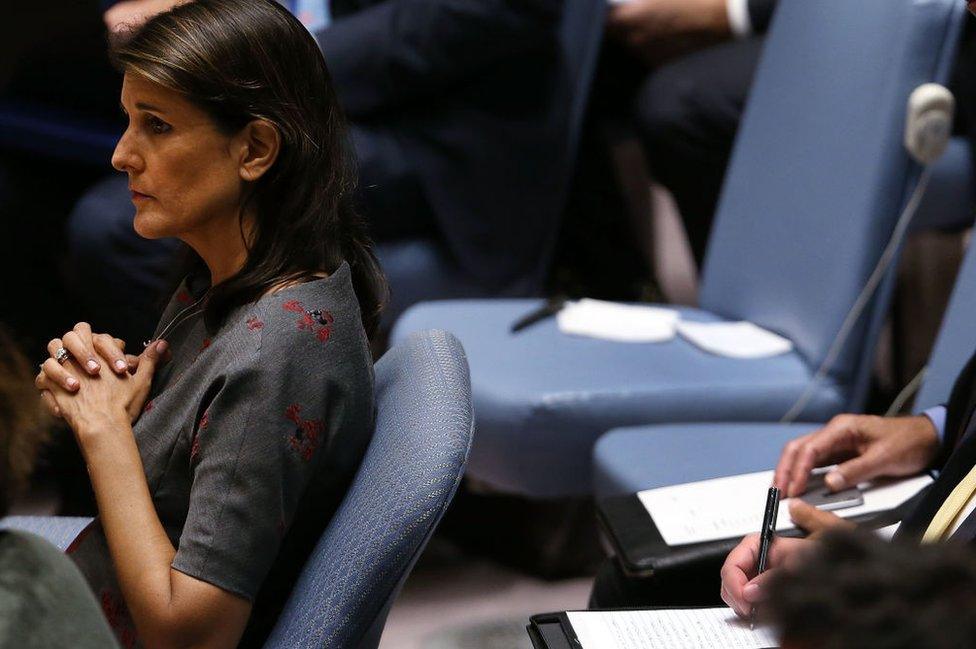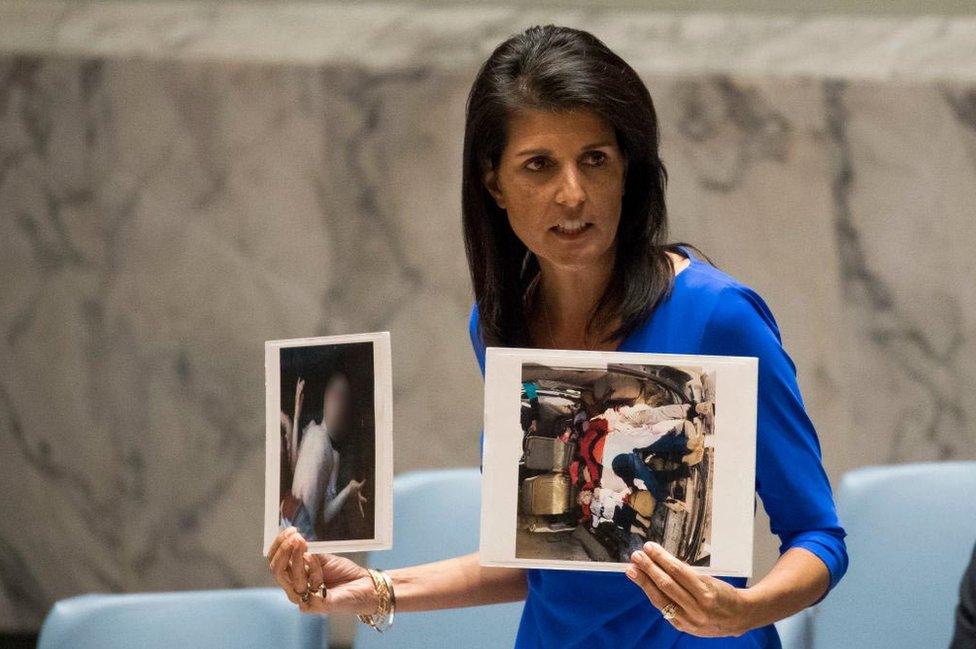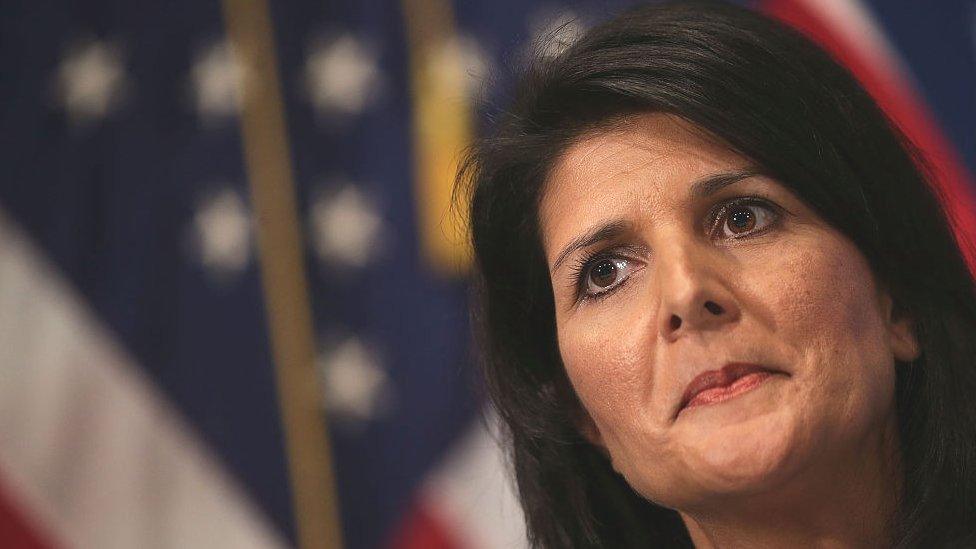Nikki Haley: Aggressive envoy who shook up United Nations
- Published

Through the revolving door of the Trump administration goes another high-level departure: the UN ambassador Nikki Haley, by far the most high-profile woman in the cabinet, and an internationalist who's done much to protect the United Nations from Donald Trump's anti-globalist wrecking ball.
At a meeting in the Oval Office, they both went out of their way to stress this was an amicable separation. Donald Trump lavished her with what for him is high praise, by saying she'd brought more "glamour" to the role.
Mrs Haley, who is widely spoken of as a possible future president, promised she had no plans to challenge him for the party's presidential nomination in 2020.
Like President Trump, she has an eye for a television moment, and after the Assad regime launched a chemical weapons strike in April 2017, she brandished pictures of dead children in the Security Council.
"The pictures of dead children were not fake news," she railed.
"They were the result of the Syrian regime's barbaric inhumanity.
"And they were the result of the regime and Russia's failure to live up to their international commitments to remove all chemical weapons from Syria."
Donald Trump: "Hopefully you'll be coming back at some point ... you can have your pick"
It provided diplomatic theatre of the most electrifying and meaningful kind.
Mrs Haley was a strident critic of Russia and Syria at the UN, and also fiercely critical of what she claimed was the global body's anti-Israel bias.
She supported shutting off US funding for the UN's Palestinian refugee agency and revelled in defending the Trump administration's decision to move its embassy in Israel from Tel Aviv to Jerusalem in the face of an acid show of international criticism.
She was also instrumental in pressuring China to support a tough sanctions regime against North Korea.
Her personal diplomacy in closed-door meetings, when she demanded immediate answers from Beijing's more cautious and sometimes slow-moving diplomats, was unexpectedly successful.

Often her style grated with colleagues.
Take her debut remarks at the UN. "I wear heels," she said determinedly. "It's not for a fashion statement. It's because if I see something wrong, we're going to kick them every single time."
This "new sheriff" in town rhetoric not only alarmed foreign diplomats but some veterans of the state department who man the US mission to the UN.
So, too, did her aggressive and repeated warnings about compiling a list of errant countries that didn't back the United States, which irritated even close allies.
But she was popular at the UN, partly for her easy 'Hi y'all" southern charm (her personal motto is "Kick 'em with a smile"), partly because she was such an unflinching critic of Moscow and Damascus and partly because she was seen as a human buffer between the White House and UN.
From the outset, she formed a strong working relationship with the incoming UN Secretary General, Antonio Guterres, and together they pushed through a reform agenda, focussing particularly on trimming the organisation's peacekeeping budget.
It is often said that the UN's biggest peacekeeping mission is directed against the Trump White House, and Mrs Haley was seen as a valuable ally.
Resurgent anti-Trump 'resistance' defines a divided America
Mr Trump does not go after the UN in the same way that he targets Nato and the World Trade Organisation, which shows how effective the Haley-Guterres partnership has been.
A former governor of South Carolina, she's a talented retail politician with the brightest of futures.
Once a foreign policy neophyte, she now has a top-ranking diplomatic assignment on her curriculum vitae.
She's also been a senior member of the Trump team, though one who managed to maintain a measure of independence.
Over the past two years, she has ticked a few important political and policy boxes. Unlike others who have served in the Trump cabinet, such as Rex Tillerson, who she hated, she has also burnished her reputation.
Nikki Haley became an articulate spokeswoman for Donald Trump's America First foreign policy, often performing clean-up duties on issues such as the Middle East when the president's tweets and offhand remarks created international confusion.
But I doubt if she's ever been a really true believer in Trumpism at home.
Asked to deliver the Republican response to Barack Obama's State of the Union address in 2016, she warned Republicans against listening to the "siren call of the angriest voices", which was a clear dig at the billionaire candidate.
In that year's South Carolina primary, she backed Florida Senator Marco Rubio, and, as an Indian-American, urged the party to be more demographically inclusive.
She was also the governor who pushed after the Charleston shootings for the Confederate flag to be lowered from the state house grounds in Columbia - a particularly brave political act in the state where the first shots of American Civil War rang out.
Watching her at the UN perform the diplomatic drudgery of listening to overlong speeches from ambassadors on countries that previously would not have been on her radar, I often wondered whether her heart was truly in it.
But on the occasions when the eyes of the world were on the Security Council, she relished her role and rarely failed to deliver the most ringing quote of the day.
Certainly, the UN has been a useful stepping stone.
One of her predecessors as UN ambassador, George Herbert Walker Bush, went from the horseshoe table of the Security Council to the White House.
It does not require a great leap of imagination to see her making the same journey.
Certainly, we have not heard the last of Nikki Haley.
- Published13 January 2016
- Published9 October 2018
